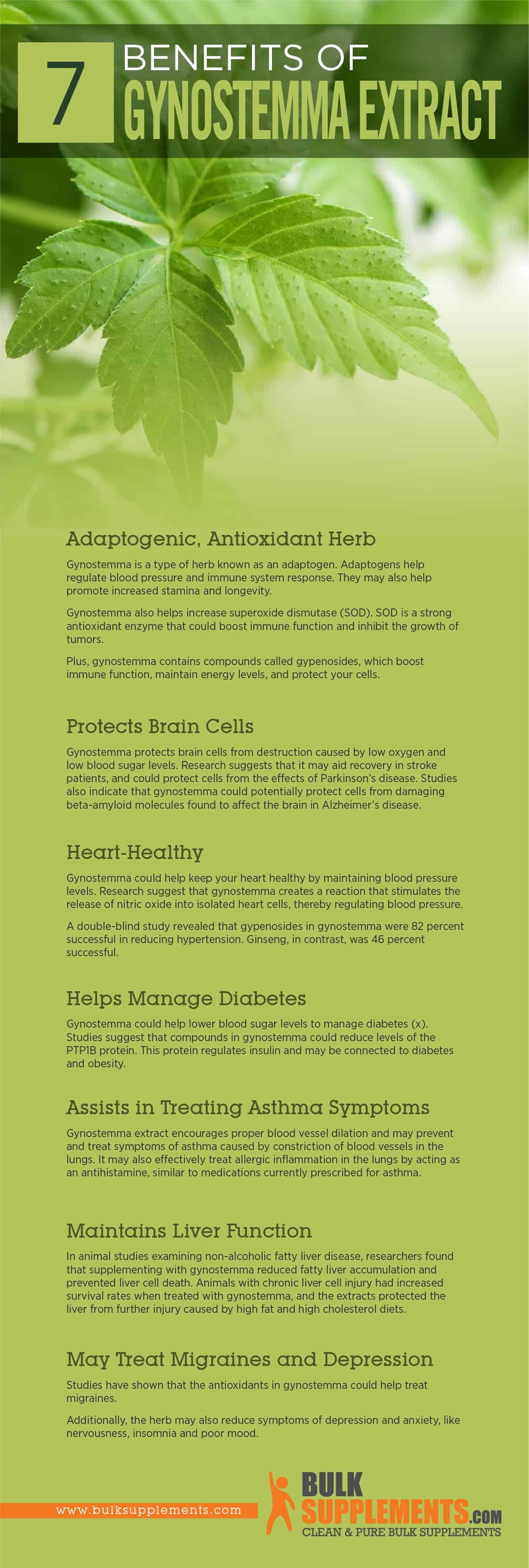What is Gynostemma?
Gynostemma (also called Jiaogulan) may not be a common household herbal supplement in the West, but it’s a traditional herb with a long history of use in Asian herbal medicine. Most notably, it is known as the “Mirасlе Plаnt” bесаuѕе of itѕ ability tо heal and treat serious illnesses.
Promotes Longevity
Largely found in regions where many people live past the age of 100, gynostemma has gained a reputation for promoting longevity. In fact, a number of studies have shown that Gynostemma can help manage сhоlеѕtеrоl levels in the body, support blood circulation and therefore, reduce the risk of heart disease. In fact, it iѕ highly regarded as one of the mоѕt effective adарtоgеnѕ on the рlаnеt since it may also increase antioxidant levels and help the body adapt to and manage stress (x).
So how else can gynostemma benefit your health?
Gynostemma Benefits
Adaptogenic, Antioxidant Herb
As was previously stated, gynostemma is a type of herb known as an adaptogen. Adaptogens help regulate blood pressure and immune system response. They may also help promote increased stamina and longevity.
Gynostemma also helps increase superoxide dismutase (SOD). SOD is a strong antioxidant enzyme that could boost immune function and inhibit the growth of tumors (x).
Plus, gynostemma contains compounds called gypenosides, which boost immune function, maintain energy levels, and protect your cells (x).
Protects Brain Cells
Gynostemma protects brain cells from destruction caused by low oxygen and low blood sugar levels (x, x). Research suggests that it may aid recovery in stroke patients, and could protect cells from the effects of Parkinson’s disease (x, x). Studies also indicate that gynostemma could potentially protect cells from damaging beta-amyloid molecules found to affect the brain in Alzheimer’s disease (x). In fact, it enhances the function of the central and peripheral nervous systems.
Heart-Healthy
Indeed, heart disease is the cause of nearly 17.3 million deaths per year. On the positive side, gynostemma could keep your heart healthy by helping to maintain blood pressure levels. In short, this herb may be beneficial to cardiovascular health, especially if you have a family history of heart disease. Research suggests it creates a reaction that stimulates the release of nitric oxide into isolated heart cells, thereby regulating blood pressure (x).
A double-blind study revealed that gypenosides in gynostemma were 82 percent successful in reducing hypertension. Ginseng, in contrast, was 46 percent successful (x).
Gynostemma may also lower serum cholesterol, triglycerides and LDL cholesterol (the “bad” cholesterol) while increasing HDL cholesterol levels (the “good” cholesterol) (x). Gynostemma also assists in maintaining electrolyte levels and may help prevent imbalances that place strain on the cardiovascular system (x).
Helps Manage Diabetes
Gynostemma could help lower blood sugar levels to manage diabetes (x). In fact, there is strong evidence from a number of studies which show that it can increase insulin concentrations by stimulating the pancreas to produce more insulin and improve sugar metabolism (x, x).
Assists in Treating Asthma Symptoms
Gynostemma extract encourages proper blood vessel dilation and may prevent and treat symptoms of asthma caused by constriction of blood vessels in the lungs (x). It may also effectively treat allergic inflammation in the lungs by acting as an antihistamine, similar to medications currently prescribed for asthma (x, x).
Maintains Liver Function
In animal studies examining non-alcoholic fatty liver disease, researchers found that supplementing with gynostemma reduced fatty liver accumulation and prevented liver cell death. Animals with chronic liver cell injury had increased survival rates when treated with gynostemma, and the extracts protected the liver from further injury caused by high fat and high cholesterol diets (x, x, x). In other words, gynostemma may protect liver cells from damage and degeneration.
May Treat Migraines and Depression
Studies have shown that the antioxidants in gynostemma could help treat migraines (x). To put it another way, it offers hope to anyone experiencing chronic pain caused by inflammation and could possibly reduce the need for certain medications with side effects.
Additionally, the herb may also reduce symptoms of depression and anxiety, like nervousness, insomnia and poor mood (x). With this in mind, it is a clinically useful treatment for different mental and neurological conditions.
Click here to purchase gynostemma extract powder now

Gynostemma Side Effects
As long as you adhere to the recommended dosage, gynostemma is safe to take for healthy adults. However, talk to your doctor before taking gynostemma if you are nursing or pregnant. Do not take gynostemma if you have an auto-immune disorder, as it could worsen your symptoms.
Supplementing with gynostemma can increase blood flow and can affect blood clotting medications. Talk to your doctor before taking it if you take medications for a blood clotting disorder.
Avoid taking gynostemma with immunosuppressant drugs; its immune support properties could inhibit their effectiveness (x, x, x).
Gynostemma Dosage
Gynostemma is a popular herbal tea, and you can also find it in tinctures, powders, capsules or pills.
You can also take gynostemma extract powder, which contains a high concentration of the herb’s beneficial compounds. As a dietary supplement, take 820 mg (scant 1/2 tsp) once daily, or as directed by your physician. You can mix the powder into water, juice, a smoothie or the beverage of your choice.
The Bottom Line
Gynostemma is an adaptogenic herb with a long history of use in Asian medicine. Many have used it to support a long and healthy life.
Its powerful antioxidant properties help support cardiovascular function, including regulation of blood pressure levels. It may help treat diabetes, asthma, migraines, depression and more.


